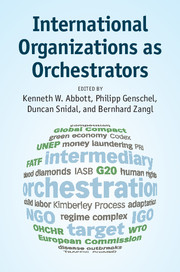Book contents
13 - Orchestration along the Pareto frontier
winners and losers
Published online by Cambridge University Press: 05 April 2015
Summary
Abstract
Our study builds on, and complements, the orchestration framework by focusing on the distributional dimension of orchestration. It accepts that orchestration is a significant and increasingly widespread phenomenon and asks the question: so what? Who are the winners and losers in these governance arrangements? What endows governance partners with power? How and why do partnerships evolve the way they do? What are the long-term distributional effects of varying power endowments among partners?
We argue that while power is central to an analysis of the distributional implications of partnerships, the sources of power have seen subtle but critical changes. In a growing number of issue-areas in global governance, the decisive source is not traditional state power based on military might or the size of the economy but rule-making power, or what we call “the power of the pen.” Such power has been migrating during the last decade or two in several key areas of the global economy, from the state to the non-state domain. The effects of this shift have often been unanticipated and startling. We offer a simple yet powerful analytical framework that generates four distinct testable conjectures regarding the question of who are the relative winners and losers in orchestration arrangements and why. These conjectures are tested through a series of hard case studies.
- Type
- Chapter
- Information
- International Organizations as Orchestrators , pp. 315 - 348Publisher: Cambridge University PressPrint publication year: 2015
- 24
- Cited by



